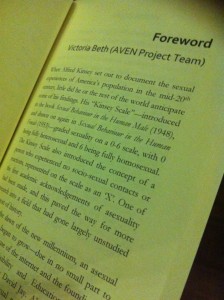It’s one thing to openly identify as queer*, another entirely to specify that it’s asexuality.
I recently had the pleasure of writing the foreword for A.K. Andrews’ anthology of asexual essays ‘Ace & Proud’, a collection of written works from asexual spectrum people about their discovery of asexuality, its impact in their relationships, and the role of the people around them in their acceptance.

In posting a photo of the segment bearing my name on Facebook, I have found myself coming out to a group of people who were previously unaware of my orientation, and who I had not thought necessary to enlighten, namely co-workers, co-volunteers, and ex-teachers. In doing so, I’ve noted a marked difference in how easily I can talk about my experiences when the person is someone who I interact with on a semi-regular basis, as opposed to how I normally operate (that is, exclusively either my closest friends and family, or complete strangers).
The irony that I am at once perfectly comfortable talking about the most intimate details of my sexual history on national radio, yet hesitate to mention the word ‘asexual’ in front of someone I work with is not lost on me. It’s one thing to openly identify as queer*, another entirely to specify that it’s asexuality.
Posting the above photo was unusually ‘loud and proud’ for me (on Facebook at least; on Twitter and YouTube I am much more open in my orientation), and it generated more interest than I had originally expected. I received comments and private messages asking for my full text and, slightly warily, I obliged. While hyperaware that this wasn’t something that I would ever be able to take back, and concerned that I would be perceived differently by people whom I hoped to continue fostering relationships with in future, I was pleasantly surprised by the reactions.
There were no invasive interrogations like I often get when giving interviews, there was genuine interest that went beyond the “Asexual? Oh, that’s weird” variety, and an ex-teacher of mine even stated that she would bring up asexuality in her topical LGBT* rights class that week. A far cry from some of the horror stories that I’ve heard over the years in the asexual community, I am fortunate that interested members in my social circle were perfectly lovely to chat to about asexuality.
Being sufficiently emotionally invested in the relationship you have with acquaintances while not knowing them well enough to predict how they will react to your coming out makes the coming out process all the more fraught with uncertainty: Will they understand what I mean when I say asexual? Will they believe me? Will they be queerphobic? Will they treat me differently? Will they see my orientation as a problem, and my coming out as a cry for help? Will this person attempt to inadvertently harm me through corrective rape? Without having broached the topic beforehand, there is not much one can really do to ‘test the waters’ before coming out to an acquaintance, and it can be a nasty shock to find the person you are in the process of befriending holds queer-or-ace-phobic views, particularly if you only find out in the process of coming out itself.
While this particular experience has been nothing but positive, I still hesitate to indiscriminately come out to my larger social circle, such as with a ‘coming out’ Facebook post. I am too proud to ever hide my orientation, but neither will I make it anyone else’s business unless they so choose.
There will inevitably come a day when my visibility work narrows the gap between what my larger social circle assumes my orientation to be and what my orientation actually is, to the point where I can no longer feasibly separate the two. Until that time comes, I will continue as I have always done: wearing my ace flag armwarmers and black ring for the benefit of those ‘in the know’, jumping into interviews and projects with no regard for who might potentially recognise me, contributing far too much whenever a conversation turns to asexuality, coming out to my closest friends, family, and to those acquaintances who are interested. And talking about whether I’ve masturbated or not to thousands of strangers, that too.
Robin’s comment
As opposed to Mycroft, I am very secretive about my orientation. I do not see it as a part of myself that everyone needs to know. I try to keep my identity in the asexual community separate from my real life. Until now, I have only come out to a handful of people, mostly close friends and acquaintances. I never had the courage to come out to my parents, since they don’t seem to accept anything outside of homosexuality, and even that is a stretch.
Because of this, I am not the best person to talk about the reactions of coming out. However, I do applaud those who have the courage to be out, and help those near them understand more about asexuality and other orientations.
The radio segment Mycroft was on: